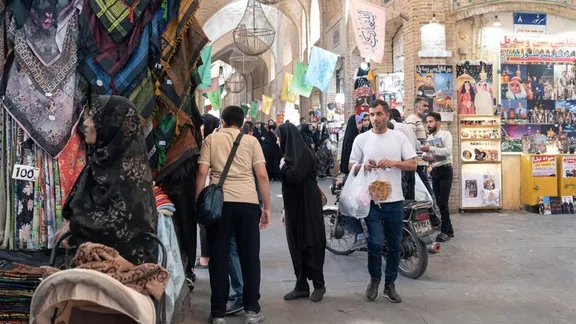Tehran infighting over sanctions persists as Iranians lament ‘empty tables’

As Iran’s factions bicker over whether returning UN sanctions are calamitous or mere “psychological” warfare, ordinary people stare into an economic abyss.

As Iran’s factions bicker over whether returning UN sanctions are calamitous or mere “psychological” warfare, ordinary people stare into an economic abyss.
“The worst way of living is life in suspense,” journalist Ehsan Mohammadi wrote on X, "It weighs down the human psyche.”
The business daily Donya-ye-Eqtesad reports basic food requirments now account for 63 percent of spending for those on the minimum wage, raising fears of a food security crisis. Lawmaker Soleiman Es’haghi lamented recently that many households can no longer afford rice, chicken or meat.
Hardliners, however, downplay the threat. The Kayhan daily, overseen by the Supreme Leader’s office, argued sanctions are “not as frightening as the West tries to scare Iran with,” calling their effects mostly psychological.
Economic Hardship
The line drew fire from reformists. Vocal academic Sadegh Zibakalam accused the opposite camp of being detached from reality in a sarcastic post on X.
“The revolutionaries are right: the return of sanctions is nothing new,” he wrote, “but the dollar, the rial and—more importantly—those willful prices do not understand this simple point that the hardliners correctly make.”
Prominent politician Mostafa Tajzadeh blamed the highest office in the land in a statement from Evin Prison following the punishing US-Israeli war in June.
He faulted Supreme Leader Ali Khamenei's stated “neither war nor peace” mantra as a failure on both scores, saying the policy drift now has Iranians sliding into poverty.
The rial has broken record lows several times since the return of UN sanctions on September 28, losing 15 percent of its value in less than a week.
Inflation, already near 45 percent, may exceed 90 percent, Tehran’s Chamber of Commerce warned this week, with growth turning negative and unemployment climbing into double digits.
Endless Suffering
Moderate journalist Akbar Montajabi captured the sense of collapse: “With the activation of the snapback mechanism and the return of sanctions, the shot has been fired not at diplomacy but at the dinner table of the middle and lower classes.”
Concerns are also rising about medicine shortages and price hikes. Although formally exempt from sanctions, many in the industry say drug procurement becomes inevitably harder with the secondary impact of other restrictions.
“Maybe a few cancers could be treated with nuclear medicine,” a user wrote on X, mocking official claims of medicinal use for the enrichment program. “But the same treatment would have been available without sanctions too—like in Turkey.”
Another user, posting under the name Saeed Pakdel, summed up the national mood: “All Iranians are preoccupied with the question: what will happen now?! The snapback mechanism has been activated. Every day we hear bad news of war and inflation … Result: confusion and endless suffering.”